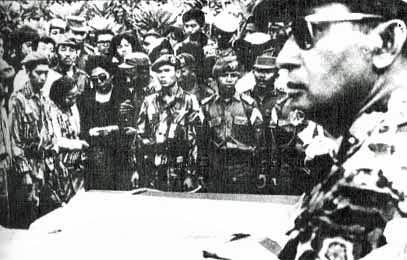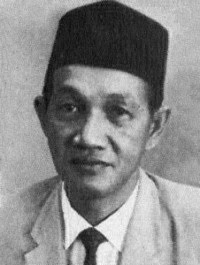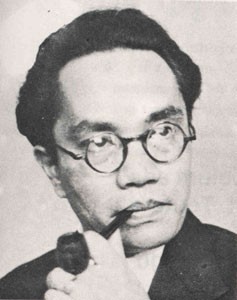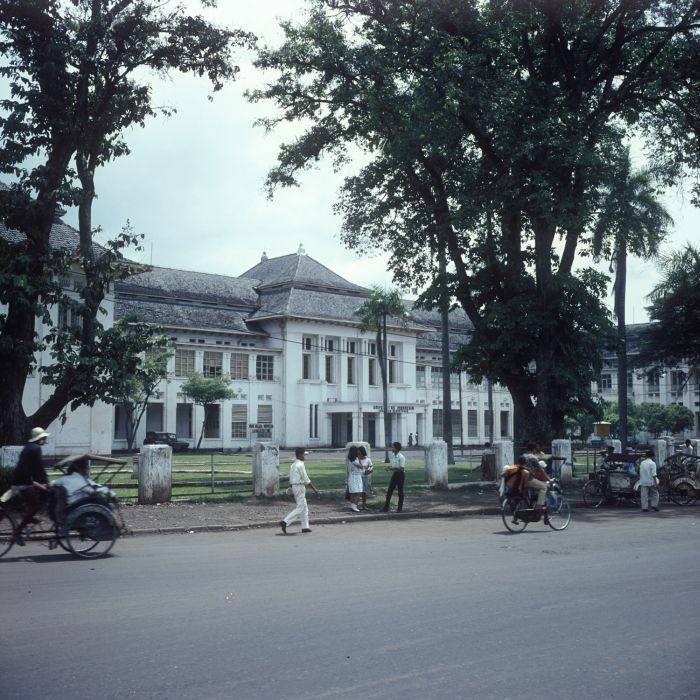|
Aidit
Dipa Nusantara Aidit (born Ahmad Aidit; 30 July 1923 – 22 November 1965) was an Indonesian communist politician, who served as General Secretary of the Communist Party of Indonesia (PKI) from 1951 until his summary execution during the mass killings of 1965–66. Born on Belitung Island, he was nicknamed "Amat". Aidit was educated in the Dutch colonial system. Biography Aidit was born Achmad Aidit in Tanjung Pandan, Belitung, 30 July 1923. He was the first son of four. His parents were Abdullah Aidit and Mailan. Achmad and his siblings studied at Hollandsche Inlandsch School. In early 1936, Achmad asked his father to continue his studies in Jakarta (then called Batavia). Achmad then attended Middestand Handel School, instead of Meer Uitgebreid Lager Onderwijs, because the registration had already been closed. For three years he lived in Cempaka Putih with his father's colleague. He moved to Senen and lived with his brother Murad who followed in Achmad's footsteps. Unwilli ... [...More Info...] [...Related Items...] OR: [Wikipedia] [Google] [Baidu] |
Njoto
Lukman Njoto or Njoto (17 January 1927 – 13 December 1965) was a senior national leader of the Communist Party of Indonesia (PKI), who joined the party shortly after the country's declaration of independence, and was killed following the 1965 coup attempt. Biography Early life Njoto was born on 17 January 1927 in the house of his grandfather, Marjono, in Jember. Njoto's parents were Raden Sosro Hartono, a descendant of the Surakarta royal family, and Masalmah. He had two younger sisters, Sri Windarti and Iramani. He and Windarti attended the Hollands Inlandsche School (HIS) in Jember and lived with their maternal grandparents in Kampung Tempean, Jember. Their father wanted them to enroll there because Dutch schools were better organized than native schools. After regular school, Njoto had private lessons in the evening with Meneer Darmo. After graduating from school, Njoto enrolled at the ''Meer Uitgebreid Lager Onderwijs'' (MULO) school in Jember. Eventually during the Japane ... [...More Info...] [...Related Items...] OR: [Wikipedia] [Google] [Baidu] |
Communist Party Of Indonesia
The Communist Party of Indonesia (Indonesian: ''Partai Komunis Indonesia'', PKI) was a communist party in Indonesia during the mid-20th century. It was the largest non-ruling communist party in the world before its violent disbandment in 1965. The party had two million members in the 1955 elections, with 16 percent of the national vote and almost 30 percent of the vote in East Java. During most of the period immediately following independence until the eradication of the PKI in 1965, it was a legal party operating openly in the country. History Forerunners The Indies Social Democratic Association ( Dutch: ''Indische Sociaal-Democratische Vereeniging'', ISDV) was founded in 1914 by Dutch socialist Henk Sneevliet and another Indies socialist. The 85-member ISDV was a merger of the two Dutch socialist parties (the SDAP and the Socialist Party of the Netherlands), which would become the Communist Party of the Netherlands with Dutch East Indies leadership. The Dutch members of ... [...More Info...] [...Related Items...] OR: [Wikipedia] [Google] [Baidu] |
Abdullah Aidit
Abdullah Aidit (23 October 1900 – 14 February 1969) was an Indonesian politician and civil servant who served as a member of the Provisional People's Representative Council. He was the father of D. N. Aidit, chairman of the Indonesian Communist Party who was executed in 1965 following the 30 September Movement. Early life and education Abdullah was born in Tanjung Pandan on 23 October 1900. He was the son of Haji Ismail, a fishery businessman in Belitung. He worked as a forest ranger, and due to his family connections he managed to put all his eight children to school at Hollandsch-Inlandsche School. He was active in the local Islamic community, founding a local Islamic education institution. Two of his sons, Achmad Aidit and Murad Aidit, studied in Batavia, at a significant cost to the family's finances. When Achmad Aidit wanted to change his name, Abdullah resisted, primarily because he did not want to handle administrative problems associated with a change of name. He even ... [...More Info...] [...Related Items...] OR: [Wikipedia] [Google] [Baidu] |
Sukarno
Sukarno). (; born Koesno Sosrodihardjo, ; 6 June 1901 – 21 June 1970) was an Indonesian statesman, orator, revolutionary, and nationalist who was the first president of Indonesia, serving from 1945 to 1967. Sukarno was the leader of the Indonesian struggle for independence from the Dutch colonialists. He was a prominent leader of Indonesia's nationalist movement during the colonial period and spent over a decade under Dutch detention until released by the invading Japanese forces in World War II. Sukarno and his fellow nationalists collaborated to garner support for the Japanese war effort from the population, in exchange for Japanese aid in spreading nationalist ideas. Upon Japanese surrender, Sukarno and Mohammad Hatta declared Indonesian independence on 17 August 1945, and Sukarno was appointed president. He led the Indonesian resistance to Dutch re-colonisation efforts via diplomatic and military means until the Dutch recognition of Indonesian indepe ... [...More Info...] [...Related Items...] OR: [Wikipedia] [Google] [Baidu] |
Indonesian Mass Killings Of 1965–66
The Indonesian mass killings of 1965–66, also known as the Indonesian genocide, Indonesian Communist Purge, or Indonesian politicide ( id, Pembunuhan Massal Indonesia & Pembersihan G.30.S/PKI), were large-scale killings and civil unrest primarily targeting members of the Communist Party of Indonesia (PKI). Other affected groups included communist sympathisers, Gerwani women, ethnic Javanese Abangan, ethnic Chinese, atheists, alleged " unbelievers" and alleged leftists. It is estimated that between 500,000 to 1,000,000 people were killed during the main period of violence from October 1965 to March 1966. The atrocities were instigated by the Indonesian Army under Suharto. Research and declassified documents demonstrate the Indonesian authorities received support from foreign countries such as the United States and the United Kingdom. It began as an anti-communist purge following a controversial attempted ''coup d'état'' by the 30 September Movement. According t ... [...More Info...] [...Related Items...] OR: [Wikipedia] [Google] [Baidu] |
List Of Deputy Speakers Of The People's Consultative Assembly
The following is a list of deputy speakers of the People's Consultative Assembly in Indonesia. See also * People's Consultative Assembly * List of speakers of the People's Consultative Assembly Notes References {{reflist Lists of political office-holders in Indonesia Politics of Indonesia Government of Indonesia Politics of Southeast Asia, Indonesia ... [...More Info...] [...Related Items...] OR: [Wikipedia] [Google] [Baidu] |
Sudisman
Sudisman (1920 – October 1968) was a general secretary of the Communist Party of Indonesia (PKI) and the only PKI leader to be put on trial following the 30 September Movement in 1965. He was sentenced to death and executed. He was the fourth highest-ranking member of the Communist Party of Indonesia's Politburo, and was the only one of the five senior leaders of PKI to be tried. All but one of the ten PKI politburo members were killed. Sudisman tried to reorganize the PKI into an underground movement after other senior leaders were captured and summarily executed. He acted as the leader of the PKI for a short time before his arrest. He was finally arrested in December 1966. Trial Sudisman was the highest ranking PKI politburo member to appear before the ''Mahmillub'' (''Mahkamah Militer Luar Biasa'', the Extraordinary Military Tribunal), as the other members had been killed. Sudisman's trial was held in July 1967. Testimonies of Sudisman and other PKI leaders greatly ... [...More Info...] [...Related Items...] OR: [Wikipedia] [Google] [Baidu] |
Wilujo Puspojudo
Wiluyo Puspoyudo (9 January 1919 — 9 January 1968) was an Indonesian military figure and politician who became the deputy speaker of the People's Consultative Assembly from 1960 until 1966, and as the acting Speaker of the People's Consultative Assembly in 1966. Early life and career Wiluyo Puspoyudo was born on 9 January 1919 in the city of Pekalongan, Central Java. He began his military career in the Indonesian Army in 1945, when he was put as the commander of the E Brigade in East Kalimantan. During his time as the commander of the E Brigade, the East Kalimantan populace began organizing resistance to the Dutch forces that were occupying East Kalimantan. The organization of the resistance began since 10 December 1946, and was formed in respond to the Dutch plan of massacring the East Kalimantan populace in the ''Fonds Nasional Indonesia'' field. Puspoyudo managed to negotiated with the Dutch. As a result, the Dutch abandoned their massacre plans. Political career On 25 ... [...More Info...] [...Related Items...] OR: [Wikipedia] [Google] [Baidu] |
Alimin
Alimin bin Prawirodirdjo ( Solo, 1889 – Jakarta, 24 June 1964)Utamakan Persatuan dan Dialog', 2002–2010 Situs TokohIndonesia, 2 October 2010. Diakses 2 February 2011 was an Indonesian independence movement figure and also Indonesian communist. Since he was a teenager Alimin was active on national movements. He was a member of Budi Utomo, Sarekat Islam, Insulinde, before he joined with the Indonesian Communist Party PKI and eventually he became leader of the organization. He was also founder of ''Sarekat Buruh Pelabuhan'' (formerly called ''Sarekat Pegawai Pelabuhan dan Lautan''). In early 1926, as the leader of the PKI, Alimin went to Singapore to negotiate with Tan Malaka in order to prepare rebellion. But, before Alimin went home, the rebellion Rebellion, uprising, or insurrection is a refusal of obedience or order. It refers to the open resistance against the orders of an established authority. A rebellion originates from a sentiment of indignation and disapprov ... [...More Info...] [...Related Items...] OR: [Wikipedia] [Google] [Baidu] |
Amir Sjarifudin
Amir Sjarifuddin Harahap (EVO: Amir Sjarifoeddin Harahap; 27 April 1907 – 19 December 1948) was an Indonesian politician and journalist who served as the second prime minister of Indonesia from 1947 until 1948. A major leader of the left-wing during the Indonesian National Revolution, he previously served as Minister of Information from 1945 until 1946 and Minister of Defense from 1945 until 1948. Amir was born into the Sumatran aristocracy, and was educated at Leiden University. At Leiden, he became a member of the board of the Gymnasium student association in Haarlem, and was involved in the Batak student organization '' Jong Batak''. He returned to Indonesia due to family troubles, but continued his education at the '' Rechts Hogeschool'' in Batavia. After graduating, he became active in literary and journalist circles, joining the editorial board of the newspaper ''Panorama''. He also became involved with left-wing politics, and led a group of younger Marxists i ... [...More Info...] [...Related Items...] OR: [Wikipedia] [Google] [Baidu] |
Gerindo
Gerindo (Indonesian People's Movement) ( id, Gerakan Rakyat Indonesia) was a pre-independence leftist nationalist political party in Indonesia. It adopted an anti-fascist stance, supporting the Dutch against the common threat from Imperial Japan, seeing this as a higher priority than immediate Indonesian independence. It subsequently joined with other nationalist parties to form the Indonesian Political Federation (GAPI). Background In 1931, Bonifacius Cornelis de Jonge became Governor-General of the Dutch East Indies and took a more hardline approach to Indonesian nationalist movements than his predecessor. As part of the clampdown, non-cooperative nationalist leader Sukarno was arrested in November 1934 followed by Hatta and Sjahrir three months later. All were exiled, while Sukarno's Indonesia party (Partindo) party, found itself leaderless. By 1935, as a result of legislation, detentions and police actions, the only non-cooperative party function was the small Indonesian I ... [...More Info...] [...Related Items...] OR: [Wikipedia] [Google] [Baidu] |
Senen
Senen is a long-established urban district of Jakarta, Indonesia that has kept many tourist attractions such as two museums, the National Library of Indonesia and Gelanggang Remaja Senen, a quite narrow alley with old Chinese and similar style shops and restaurants. It was first developed in the 18th-century as ''Pasar Senen'' when governor Daendels established the ''bovenstad'' ("the upper town") as the new center of government of the fledgling city (then known as Batavia). Its kernel remains in what is now the formal lower-tier Village/Neighbourhood of Senen, within, the others being Kwitang, Kenari, Paseban, Kramat, and Bungur. This article covers the archetypal core and the whole Subdistrict of Central Jakarta. Toponym The name abbreviates Pasar Senen, "Monday Market". Limits The limits are a railway line to the east, Ciliwung River to the west, Jalan Pramuka Street to the south, and Jalan Abdul Rahman Saleh-Kwini II-Senen Raya IV (Jalan meaning road/street) to the north. ... [...More Info...] [...Related Items...] OR: [Wikipedia] [Google] [Baidu] |




